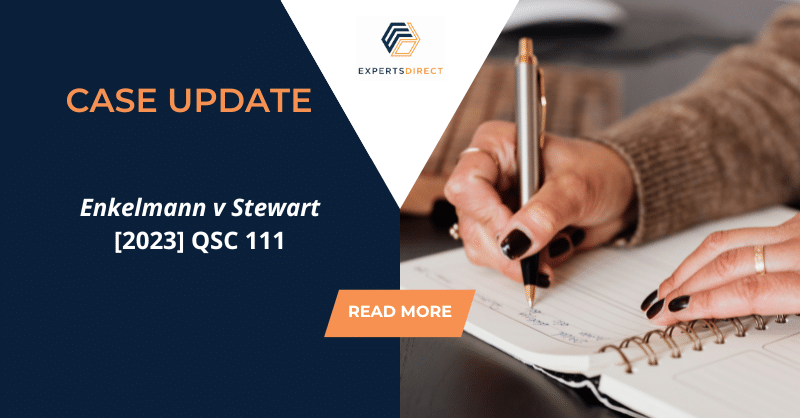Enkelmann v Stewart [2023] QSC 111
Note: this case concerns the Uniform Civil Procedure Rules in force in Queensland. The issue of whether a document consisting of a statement or a report of an expert is not privileged from disclosure may differ to the requirements of other courts in other jurisdictions.
In this case, the Supreme Court of Queensland considered whether file notes of solicitors recording details of conferences with an expert with respect to their opinion on an issue directly relevant to proceedings was subject to a valid claim of legal professional privilege.
Background
The plaintiffs alleged the defendants had, through nuisance and negligence, caused flooding on their land because of works undertaken on the defendants’ land.
The plaintiffs had originally relied on the expert evidence of Mr S, a hydrologist. Some years after the proceedings were commenced, they presented evidence from another hydrologist, Mr G. Mr G was retained to produced new modelling which was then incorporated into the plaintiffs’ third amended statement of claim.
Expert evidence
During cross-examination, Mr G was taken to a letter of 1 November 2021 in respect of instructions he had been given, part of which was a request that he consider two things (described as a “peer review”):
- the differences between a report of Mr S, the plaintiffs’ original expert hydrologist, and Dr M, the expert retained by the defendants; and
- identify anything wrong with the accuracy of the approach taken by either Mr S and Dr M, including their methodology, and to give an opinion about what methodology should be preferred.
The expert reports filed and tendered by the plaintiffs did not address those requests. In cross-examination it was discovered that Mr G had provided a verbal opinion in respect of those two requests to the plaintiffs’ solicitors and was subsequently asked in the letter of instruction of 1 November to address those questions.
During cross-examination, Mr G indicated that he was “called off” from producing a report dealing with the peer review and did not address what his opinion was in respect of Mr S’ report.
The Application
Following the cross-examination of Mr G, the defendants made an application for disclosure of “all file notes taken by [solicitors for the plaintiffs] in respect of any statement given by Mr G”. They also sought disclosure in respect of “any document which may reflect Mr [G’s] state of mind at any point of time during his engagement as an expert for the plaintiffs, including during conferences [the plaintiffs’ solicitors] had with Mr [G] in respect of his draft opinions”.
The Court was required to consider whether the application for disclosure of the file notes was appropriate under r 212(2) of the UCPR. This rule provides that a document consisting of a “statement or report” of an expert is not privileged from disclosure. This consideration required the court to have regard to the provisions of the Acts Interpretation Act 1954 (Qld) and the definition of “document”.
The key issue in the application of r 212(2) is whether a particular document or category of documents can be properly characterised as consisting of a statement or report of an expert. Not every file note prepared by a solicitor in respect of the engagement of an expert would be caught by the sub-rule. [64] However, a solicitor’s file note recording the opinion of an expert on an issue directly relevant on the pleadings would be caught by r 212(2). The sub-rule is not limited to reports drafted or prepared by the expert. [65]
Williams J went on to say that draft reports, draft statements of opinion or summaries of fact relied upon by an expert would also fall within what is incorporated by a document consisting of a statement or report of an expert for the purposes of r 212(2). There is no limitation in that rule that the actual document itself needs to emanate from the expert. What is inherent in sub-rule (2) is that the document incorporates the opinion, being the statement or report of an expert, not the provenance of the document itself. [67]
For these reasons, plaintiffs were ordered to disclose any document in the possession or under the control of their lawyers being any statement of Mr G, which was directly relevant to the issue on the pleadings.
The Court also observed that given the definition includes any “disk, tape or other article or any material from which sounds, images, writings or messages are capable of being produced or reproduced”, an expert statement made during a recorded Zoom call, or a dictation device could also constitute a document for the purposes of r 212(2) of the UCPR.
Key takeaways
- In Queensland, r 212(2) of the UCPR abrogates privilege in statements or reports (including draft reports) made by experts.
- A document consisting of a statement or report of an expert goes beyond just the actual report produced by the expert for the purposes of proceedings and can include expressions of opinion by an expert recorded in a “document” as defined in the Acts Interpretation Act 1959 (Qld).
- The operation of r 212(2) is concerned with the incorporation of an expert’s opinion in a document, not the provenance of the document itself. Privilege may therefore not subsist in documents such as the file notes of a solicitor, or a recording of a meeting with an expert which contains the opinions of the expert.
Read the full decision here.
